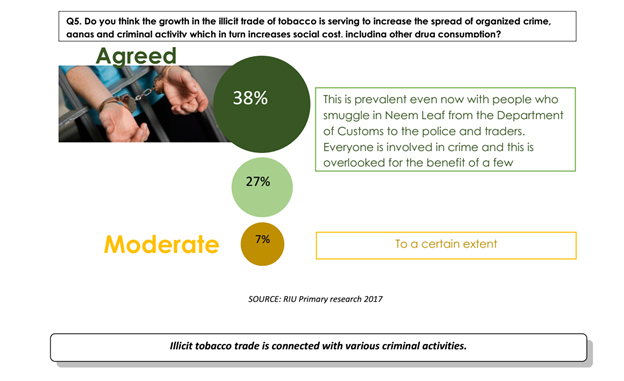October, 10, 2018

RIU - Increasingly the illicit tobacco network is becoming a threat to national law and order as well as security. Benefitting from access to new markets with different legal and cultural conditions, organised crime has expanded its engagement in illicit trade significantly.
In a recent report on the tobacco industry the Research Intelligence Unit (RIU) said the trade is used extensively by organised crime groups to profit. Given softer penalties compared to higher profits, criminals have developed sophisticated mechanisms to smuggle goods to Sri Lanka. The RIU report says a focus group comprised of various stakeholders involved in prevention and policy making agreed that the growth in the illicit trade of tobacco is serving to increase the spread of organized crime, gangs and criminal activity. “It results in higher social cost in addition to driving the consumption of other forms of drugs.”
Organised crime groups engaging in illicit trade have become very professional in exploiting the different legal frameworks and tax regulations in various countries to their advantage. Additionally, due to the new dimensions the world wide web brings to our daily life and consumption behaviour and the increasing shift of trade markets to the virtual space, national borders do not constitute an obstacle to illicit trade anymore. The internet allows offenders to communicate and coordinate anonymously and across borders.
In the past, the main focus of law enforcement authorities was put on drug trafficking, arms smuggling and human trafficking, which were perceived to pose a more immediate threat. This demonstrates that, while looking for more profitable sources of income, organised crime expands into new markets that are less controlled, have a low risk of detection and where punishment and prosecution pressure are lower.

In Sri Lanka, increased regulation and taxation of the legal industry has resulted in the illicit trade in tobacco. A 40+ percent increase in the price of a cigarette stick in October 2016 made Sri Lankan cigarettes the most expensive in absolute terms in the South-East Asian region and the second most expensive on a PPP basis globally. With this turn of events, Sri Lanka has now emerged as a “high price hot spot” and a prime target for the global illicit tobacco trade.
RIU’s report which also sheds light on the illicit tobacco market size estimates the illicit cigarettes % (as % of total cigarettes consumption) can be somewhere around 14 -18 percent while share of illicit beedi can be around 26 to 29 percent. Thus, on average 42.8 to 58 million sticks of illicit cigarettes and 122.6 to 146.4 million sticks of illicit beedi are being sold at the local markets per month.
Illicit tobacco enters a country by both air and sea. Traffickers often disguise themselves as inbound tourists and passengers to smuggle cigarettes concealed in baggage through airports. Rising illicit tobacco smuggling is becoming a global concern and many countries have joined the fight against this illegal trade.
Under Article 15 of Framework Convention on Tobacco Control (FCTC) a protocol has been established to prevent illicit trade in tobacco products which states that the convention should deal with all forms of illicit trade in tobacco products, including smuggling, illicit manufacturing and counterfeiting. This was taken to reduce the impact of consuming low quality illicit tobacco products. Sri Lanka became a Party to the WHO FCTC in 2005 and acceded to the Protocol to Eliminate Illicit Trade in Tobacco Products in 2016.
On 27 June 2018, with more than 40 parties, the conditions for the entry into force of the Protocol to Eliminate Illicit Trade in Tobacco Products (the Protocol) were met. Accordingly, the new international treaty came into in to force on 25 September this year. The entry into force of the Protocol is an historical event and will be followed by the first session of the Meeting of the Parties (MOP1) to the Protocol. Taking place in Geneva from 8 to 10 October, it will be the first opportunity for the Parties to the Protocol to discuss its implementation.
However, the SriLankan policy makers are yet to lay down any tangible plans to implement the protocol while there also seems to be no commitment by the government on curbing illicits.
It is evident from the RIU report that an increasing and disproportionate tax structure has incentivised criminals to engage in illicit tobacco trade. Whilst significant progress has been made where health is concerned, RIU notes that recent government measures have created potentially serious economic costs in terms of the loss of revenue to the government as well as negative social costs that are continuing with the growth in smuggling and related criminal activity.
The illicit trade in tobacco, as is noted in a Financial Action Task Force report, has the potential to promote “criminality and corruption within government, which can coincide with an increase in tolerance of criminality, which in turn encourages and attracts national and international crime groups” (FATF 2012).
Video Story